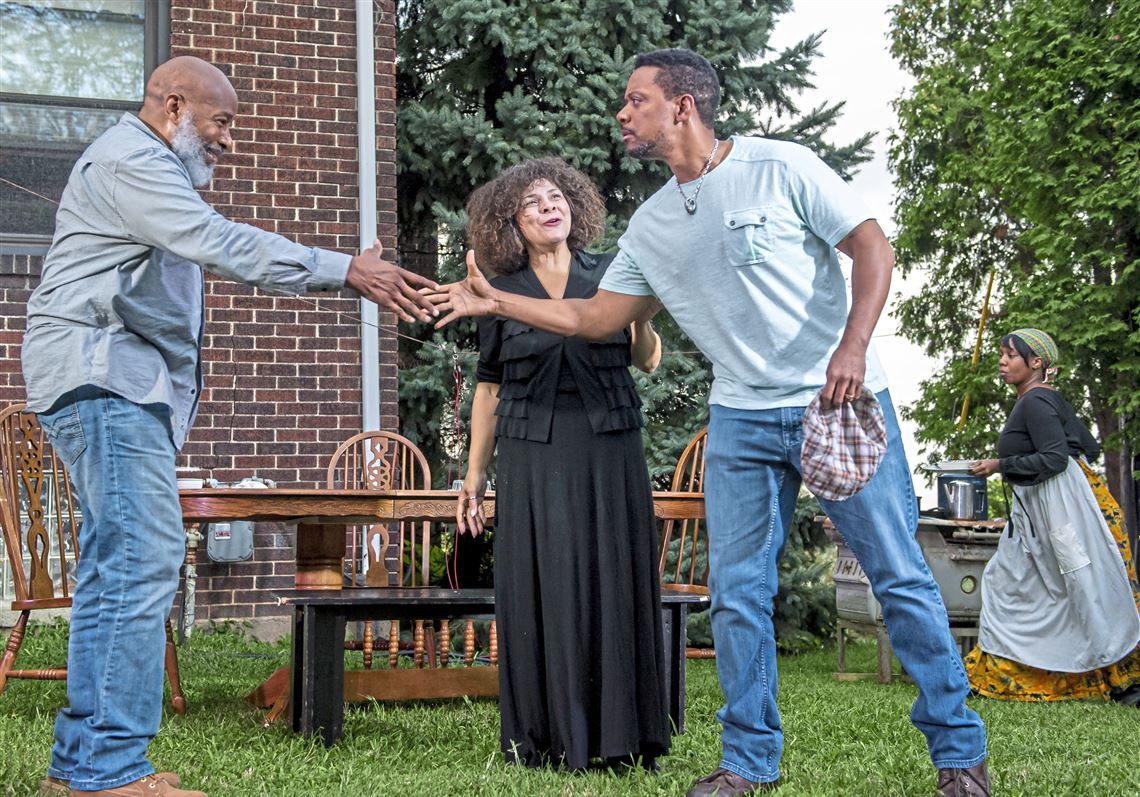The play is set in 1904, the Hill District, Pittsburgh Pennsylvania, in the parlor of Eli, Aunt Ester and Black Mary’s home at 1839 Wylie Ave.
The play is August Wilson’s “Gem of the Ocean,” and those instructions place the address on what had long been an empty hillside lot.
Today, 1839 Wylie Ave. is empty no more.
Where: Pittsburgh Playwrights Theater Company at 1839 Wylie Ave., Hill District.
When: All performances 7:30 p.m. Opening Saturday, Aug. 24-26. Then Friday-Monday through Sept. 22 (no Labor Day performance on Sept. 2).
Tickets: $37.50, or $18.39 on Monday Community Nights; pghplaywrights.org/gem.
Parking: At the former Shop n Save parking lot at 1850 Centre Ave. (map and instructions at pghplaywrights.org).
Crews have leveled off portions of the hill, creating a stage and seating area from scratch. In the process, they have been digging up bricks and stones from previous residents of the site beside Nazareth Baptist Church, at 1845 Wylie, and between Roberts and Granville streets.
Following two previous outdoor productions of works at the nearby August Wilson House, Pittsburgh Playwrights Theatre Company is once again on the road, this time for “Gem” and the address is as prescribed by the late great Pittsburgh writer.
The site is a few short blocks from Wilson’s childhood home at 1727 Bedford Ave., blocks that the future Pulitzer Prize-winner would walk as he was escorted to St. Brigid Church, at 1833 Wylie, by a neighborhood friend. St. Brigid School, to the rear of the church and nearest to the lot on Wylie, is the likely culprit for challenges faced by Pittsburgh Playwrights as it brings “Gem” home. St. Brigid was demolished in the 1960s.
Above the lot, on Enoch Street, is the Grayson Community Center (the former Ozanam Cultural Center), and host to the ambitious venture.
“Gem of the Ocean” is the chronological beginning of Wilson’s American Century Cycle, set in 1904. He wrote other plays before “Gem,” but this is his most direct link to slavery and the treacherous path for free black men and women in the diaspora that led many to Pittsburgh’s Hill District.
The protagonist of “Gem of the Ocean,” Aunt Ester, had been a monumental but unseen character in previous plays (“Two Trains Running”; “King Hedley II”),” but it took Wilson a while to find the voice of the 285-year-old character. She is described as a “very old, yet vital spiritual adviser to the community,” and was christened by Wilson as “the most significant persona of the cycle.”
Ruben Santiago-Hudson, whose family has roots in Clairton and who has written the film adaptation of “Ma Rainey’s Black Bottom,” was an original cast member of the Broadway production of “Gem,” along with Wilsonian actor Phylicia Rashad as Aunt Ester.
Rashad, in a foreword to the hard-bound script of “Gem,” wrote that Wilson first heard Aunt Ester speak while at the Hill District diner Eddie’s that was located at the corner of Wylie and Kirkpatrick streets.
As an example of Wilson as a man of “purpose, specificity and deliberation,” she noted the number above Aunt Ester’s door, 1839 Wylie Ave., refers to the Underground Railroad — it was in 1839 that newspapers first mentioned an “underground railroad” that helped enslaved people escape north to freedom. That also is the year of the Amistad revolt, in which dozens of native Africans who had been sold into slavery overtook their captors aboard a Cuba-bound ship and wound up on the shores of the United States. After a long court battle, 35 surviving Africans were returned home.
Actor-director Monteze Freeland, who assists Playwrights artistic director Mark Clayton Southers, was standing in the lot on a windy July day, when it was still a blank slate, and comparing the Wylie Avenue site to the production challenges faced behind the August Wilson House.
“Before, the house was the set,” Freeland said. “All we had to do was to build steps to it. Here, we have to build the set, bring in furniture and create a more intricate lighting grid than we’ve had before.”
Some of the hillside steps from Wylie Avenue to the Grayson Center were in disrepair, but plans were in place to have them covered in wood by the first preview, on Aug. 23. Opening night is Aug. 24 — weather permitting. The audience will be guided from below Wylie, coming up from the Shop ’n Save lot at 1846 Centre Ave. Accessibility is another challenge, but there is some onsite parking.
Hill District neighbors are being prepped for the hoped-for influx of theater patrons, Freeland said. “We’ve been reaching out not only to the people whose properties are right here, but also trying to include the community.”
Actor Sam Lothard has been speaking with nearby church congregations on Sundays and getting the word out about Pittsburgh Playwrights’ Community Nights on Mondays, when ticket prices are $18.39 and there will be food trucks “to entice people who live here, to be here. This is a community effort.”
Just being outdoors creates its own set of problems — something Freeland knows well. He was in the cast in Quantum Theatre’s “King Lear,” performed at different spaces and with no shield from the elements, on the Carrie Furnace site in Rankin. The show mostly went on, even on several heavy rain and wind days.
While the stage was being erected, actors preparing for the opening at Southers’ Hill District home got a surprise visit: Oscar-winning actor-director Denzel Washington, who is the producer of the filmed-in-Pittsburgh “Ma Rainey’s Black Bottom,” stopped by and recorded them at work.
The director of “Gem of the Ocean” also is well-acquainted with Wilson’s work. Andrea Frye, of Atlanta, has directed the play and starred in it as Aunt Ester, who for this production will be played by Chrystal Bates.
Frye “is someone who when you meet her, she has this youthful side to her that seems timeless,” Freeland said. “She’s a tall woman with beautiful white hair. Sometimes I come into the rehearsal room and she’s sitting on [Aunt Ester’s] grand throne, and it’s like, ‘Wow.’
“I think it’s wonderful,” he continued, “to have her energy directing this play that I consider to be one of August Wilson’s more feminine plays, in the sense of the heart and love and guidance in it, led by the matriarch. To have a woman leading that, I think is so special.”
Freeland, a native of Baltimore, a Point Park grad and last year’s PG Performer of the Year, had one of his early Pittsburgh roles in “Radio Golf,” in which Aunt Ester’s house is described by one of the characters — a preservationist — as “a Federalist brick house with a good double-base foundation. I couldn’t believe it. It has beveled glass on every floor. There’s a huge stained-glass window leading up to the landing. And the staircase is made of Brazilian wood with a hand-carved balustrade. … If you run your hand slow over some of the wood you can make out these carvings. There’s faces. Lines making letters. An old language. And there’s this smell in the air. …The air in the house smells sweet like a new day.”
In 2010, Freeland was directed by Vernell Lillie in the Kuntu Repertory Theatre production of “Radio Golf,” and she took the cast on a tour of the Hill, including the site of Aunt Ester’s home. That was when he first heard “that there was never really an 1839. We are in the vicinity, though, that’s for sure.”
And another thing is certain. For Freeland and anyone familiar with Wilson’s work, “This is a place of legend,” he said.
Sharon Eberson: seberson@post-gazette.com or 412-263-1960. Twitter: @SEberson_pg. Sign up for the PG performing arts newsletter Behind the Curtain at Newsletter Preferences.
First Published: August 22, 2019, 10:00 a.m.
Updated: August 22, 2019, 1:27 p.m.

















